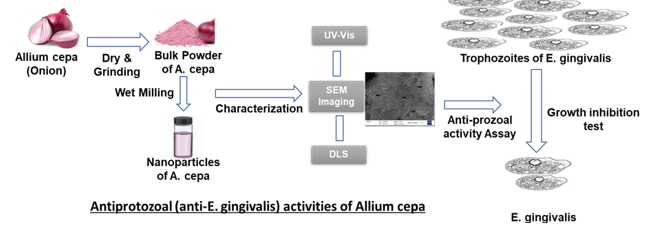Green synthesized Allium cepa nanoparticles with enhanced antiprotozoal activities for E. gingivalis

Keywords:
Anti-amoebic, Onion, nanoparticles, allium cepa, nanomedicine, dentistryAbstract
Allium cepa has phytochemical characteristics well known to be used in our gastronomy. Due to its particle size, low systemic bioavailability is the major disadvantage associated that pose major hurdle for its use for medicinal purpose. These limitations can be overcome by converting the bulk size particles to nanosized particles. The present study was to prepare the nano-particles of Allium cepa with improved aqueous solubility, and to investigate their in-vitro efficacy against Entamoeba gingivalis, a protozoan associated with poor oral hygiene leading to advanced periodontal disease. Allium cepa nanoparticles of the size ranging 85–95 nm with the aqueous solubility of upto 3 mg/mL were prepared, and the anti-amoebic activities were tested in-vitro against Entamoeba gingivalis (ATCC 30927). The trophozoites of Entamoeba gingivalis were cultured in the presence of Allium cepa’s Bulk/nano- particles or metronidazole, the inhibition caused by each particles type at various concentrations was calculated by counting the viable trophozoites under the inverted microscope. Allium cepa nanoparticles showed inhibitory results of more than 80%, which is comparable with that of standard drug Metronidazole against E. gingivalis demonstrating its use as a potential anti-parasitic herbal drug.



